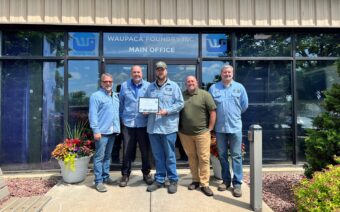
July 29, 2024
MANITOWOC – Over the past year, Lakeside Foods, headquartered at 2400 S. 44th St. in Manitowoc, has supported community food pantries and regional feeding programs with more than 300,000 pounds of in-kind food donations.
In volume, that equates to more than seven semi-truck loads of canned and frozen vegetables and meats.
“We are committed to supporting our community through philanthropy and employee volunteerism, and we’re particularly focused on doing our part to address food insecurity faced by families in our area,” Lakeside President/CEO Joe Yanda said.
Anne Smith, Lakeside’s communication director, said the company has a long history of giving back to the community.
“The company has always prioritized giving back, especially as it relates to food donations,” she said. “I’ve been here six years, but before I came, the company previously donated to relief programs where there were hurricanes or other instances like that. We’ve also supported community food pantries on an ad hoc basis. Helping the community is built into our culture.”
Because donating to various food pantries “is a lot of work,” Smith said, Lakeside is doing things a bit differently this past year.
“We’ve tried to create a more coordinated, strategic effort around donating food,” she said.
That effort, Smith said, led to a partnership with Grow It Forward – a food pantry and feeding program located in Manitowoc.

“They also do community meals,” she said. “It also has a retail restaurant where the proceeds of what it sells goes back into the organization. They’re supporting people in need in the Manitowoc community on a lot of different levels.”
Smith said Grow It Forward receives the food/meat donations from Lakeside and then it takes care of distribution.
“Grow It Forward is a resource to help some of the smaller church food pantries and neighboring communities,” he said.
In the past, Smith said Lakeside received calls from places asking “for a couple of cases of food here and there.”
Since partnering with Grow It Forward, she said the calls have slowed down.
“We want the food to go to a good place, but we also need to make it efficient and make sense for our staff,” she said. “(The old way) was time-consuming.”
Coordinating donations with one entity, Smith said, helps ensure that the food will get where it’s needed most.
“We’re in the midst of getting Grow It Forward several pallets,” she said. “They can then store the food in their supplies and share it with the few hundred families they serve weekly – they also share food with other places.”

The change in process, Smith said, has worked well because “it’s much easier for our staff.”
“Working on larger donations (to Grow It Forward) is more efficient than working with smaller donations here and there,” she said.
Smith said Lakeside also sponsored Grow It Forward’s Empty Bowls fundraiser last November.
“Companies like Lakeside play a vital role in addressing the pressing issue of hunger in our community,” Amber Daugs, founder/CEO of Grow It Forward, said. “My team is grateful for the support of Lakeside Foods – it’s truly a match made in the field of dreams.”
Though their efforts are for the most part coordinated through Grow It Forward, Smith said Lakeside also supports Peter’s Pantry, the Manitowoc Salvation Army, Feeding America Eastern Wisconsin (Appleton) and the Bay-Lakes Boy Scouts in delivering food donations to residents and families needing help.
On an annual basis, Smith said Lakeside donates more than 100,000 pounds of in-kind food.
The process
Lakeside supplies frozen and canned foods to the retail, food service and industrial sectors.
Since its beginning in 1887 as a small pea-canning plant, Smith said Lakeside has expanded to 14 production facilities, producing canned and frozen vegetables, canned meat, smoked sausage and hot dogs, frozen desserts, appetizers and canned pet food.
“We partner with farmers to lease acreage to grow our crops,” she said.
The donations Lakeside is able to distribute, Smith is ultimately tied to “how much product we have and can share.”

Donations, Smith said, include both saleable goods and finished products that don’t meet the company’s stringent quality standards but are still safe for human consumption, like slightly dented containers.
“Lakeside has to follow FDA (Food and Drug Administration) regulations,” she said. “Maybe a can is dented, or something like that, but the product we donate is absolutely usable.”
Smith said labeling and nutrition facts must also be present – or at least supplied to an organization – on its donated items.
“We have to be careful about giving away products not labeled or that don’t have a nutrition label for allergen reasons,” she said. “That’s one of the things we’ve worked through with the food pantries – to make sure if it’s an unlabeled can or pallet, they’re getting the nutrition labeling information that can be passed along to their clients.”
More on Lakeside
Smith said Lakeside’s production plants are primarily based in the Midwest.
“But we also distribute in other countries,” she said. “The export business is a small portion of Lakeside’s business.”
In the grocery store, Smith said Lakeside products are typically labeled under a store brand or private brand label.
“Our 14 different production facilities produce products for grocery stores, restaurants, food service distributors and industrial uses, as well as across the United States,” she said. “If you think about every major grocery retailer consumers shop in, our products are likely going to be there.”

Smith said each of Lakeside’s production plants has an agricultural team.
“How much we do in terms of planting and harvesting our product is dependent on the product,” she said.
Lakeside, Smith said, doesn’t do all its own planting.
“I’d say it’s more of a combination of us and farmers,” she said. “For example, we mostly plant peas, carrots, beets and green beans – oftentimes, farmers grow their own corn. It also depends on the equipment we have available. In short, we manage the crops from planting to harvest.”
Smith said Lakeside also utilizes seasonal employees.
“It all depends on the product, which dictates how busy we are in the process,” she said. “There are items we also purchase and process.”
For more information on Lakeside Foods, visit lakesidefoods.com.
 The art of baking: From art galleries to the kitchen
The art of baking: From art galleries to the kitchen Big Guns Tattoo making a big impact in Fox Valley
Big Guns Tattoo making a big impact in Fox Valley








